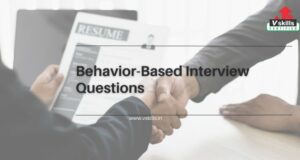In the world of Human Resources (HR), the interview process is a critical step in selecting the right candidates for job positions. While HR professionals rely on various tools and techniques to evaluate candidates, one approach that stands out is the use of open-ended questions. Open-ended questions encourage candidates to provide comprehensive, insightful responses, allowing interviewers to gain deeper insights into their qualifications, character, and potential fit within the organization. In this blog, we’ll explore the importance of open-ended questions in HR interviews and how they can help make better hiring decisions.
What Are Open-Ended Questions?
Open-ended questions are designed to prompt detailed responses from interviewees. Unlike closed-ended questions, which can be answered with a simple “yes” or “no,” open-ended questions require candidates to share their thoughts, experiences, and opinions. These questions typically start with words like “what,” “why,” “how,” or “tell me about.” The purpose of open-ended questions is to elicit meaningful, unscripted responses, allowing interviewers to assess a candidate’s knowledge, skills, and personality more effectively.
The Importance of Open-Ended Questions in HR Interviews
Encouraging In-Depth Responses
One of the primary advantages of open-ended questions in HR interviews is their ability to encourage candidates to provide in-depth, detailed responses. Closed-ended questions often lead to short, surface-level answers that do not reveal much about a candidate’s qualifications or character. In contrast, open-ended questions prompt candidates to share their experiences, thoughts, and perspectives, giving interviewers a clearer understanding of their abilities and personality.
For example, instead of asking a closed-ended question like, “Do you have experience in team leadership?” an open-ended question such as, “Can you tell me about a specific situation where you had to lead a team and the challenges you faced?” allows candidates to narrate a relevant experience, highlighting their leadership skills and problem-solving abilities.
Assessing Problem-Solving Skills
Open-ended questions are invaluable for evaluating a candidate’s problem-solving skills. By asking candidates to describe how they have handled specific challenges or situations in the past, interviewers can gauge their ability to think critically and find solutions. This is particularly crucial in HR interviews because problem-solving skills are often key indicators of an individual’s suitability for a role, especially when the position involves troubleshooting, decision-making, or innovation.
Evaluating Communication Skills
Communication skills are essential in almost every job, and open-ended questions provide an effective means of assessing a candidate’s ability to express themselves clearly and concisely. When candidates respond to open-ended questions, interviewers can evaluate their communication skills in real-time. How well do they articulate their thoughts, convey ideas, and communicate complex information? Clear, articulate communication is vital in HR interviews as it can indicate how effectively a candidate will interact with colleagues, clients, or customers in a professional setting.
Understanding Thought Processes
Open-ended questions offer HR professionals a window into a candidate’s thought processes. These questions allow interviewers to understand how candidates approach problems, make decisions, and strategize. By asking candidates to explain their thought processes or walk through their decision-making in specific situations, interviewers can gain valuable insights into a candidate’s analytical skills and their alignment with the company’s values and goals.
Uncovering Soft Skills
Soft skills, such as adaptability, teamwork, and emotional intelligence, are often as crucial as technical skills in many job roles. Open-ended questions help HR interviewers uncover these soft skills by encouraging candidates to discuss their experiences and challenges related to teamwork, leadership, or conflict resolution. For example, a question like, “Can you provide an example of a time when you had to work with a difficult team member and how you resolved the situation?” can reveal a candidate’s interpersonal skills, their ability to adapt, and their emotional intelligence.
Promoting Candidate Engagement
Engagement is essential during an interview. When candidates feel engaged, they are more likely to provide honest, comprehensive responses. Open-ended questions make candidates active participants in the interview process. They require candidates to think, reflect, and share their experiences, making the interview a two-way conversation rather than a one-sided interrogation. This engagement can help candidates relax, resulting in more authentic responses and a better overall impression of the organization.
Evaluating Cultural Fit
Hiring isn’t just about finding the most qualified candidates; it’s also about identifying individuals who will fit into the company culture. Open-ended questions can help assess cultural fit by allowing candidates to discuss their values, work style, and experiences. By asking questions related to company culture and values, HR professionals can gauge how well candidates align with the organization’s ethos, making it easier to identify those who are more likely to thrive within the company.
Sample Open-Ended Interview Questions
Now that we’ve established the importance of open-ended questions in HR interviews, here are some sample questions you can incorporate into your interview process:
- “Tell me about a project or accomplishment you’re particularly proud of. What was your role, and what challenges did you face?”
- “Can you describe a situation in which you had to work with a diverse team? How did you ensure effective communication and collaboration?”
- “How do you handle high-pressure situations or tight deadlines? Can you provide an example from your previous work experience?”
- “What do you believe are the most important qualities of a successful leader? Can you share a story of a time you demonstrated these qualities?”
- “Can you walk me through your decision-making process when faced with a difficult problem? Provide a specific example from your professional background.”
- “Describe a situation where you had to adapt to a significant change or challenge in your work environment. How did you approach it?”
- “In your opinion, what makes a company’s culture strong and supportive? How do you see yourself contributing to our company’s culture?”
Conclusion
Open-ended questions play a pivotal role in HR interviews, enabling interviewers to gather insightful, detailed information about candidates. They encourage in-depth responses, help assess problem-solving and communication skills, reveal thought processes and soft skills, and promote candidate engagement. Furthermore, these questions assist in evaluating cultural fit, ensuring that the selected candidates align with the organization’s values and goals. In the competitive landscape of modern businesses, making informed hiring decisions is paramount, and open-ended questions are an essential tool in the HR professional’s toolkit. By incorporating these questions into your interview process, you can identify the most qualified candidates who will not only excel in their roles but also contribute positively to the company’s culture and success.




